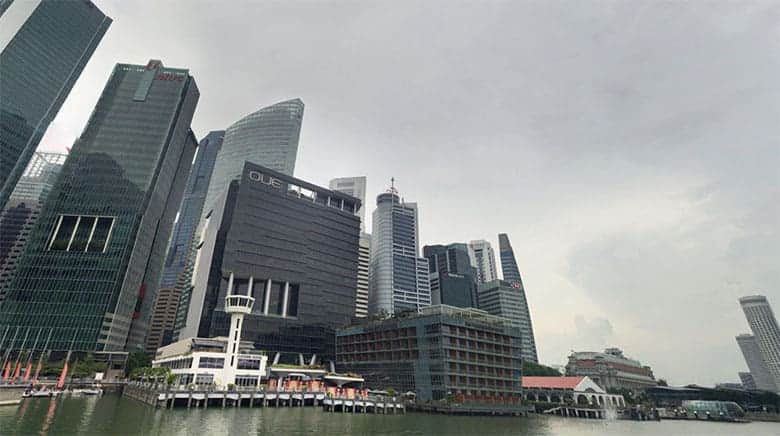
An Allianz fund is said to be in talks for a stake in Singapore’s OUE Bayfront
The COVID-19 pandemic drove down investment in commercial real estate across Asia Pacific by 36 percent in the first nine months of 2020, but one of the biggest purchasers of property assets in the region still managed to boost its APAC holdings by 16 percent during the period.
With the public health crisis disrupting travel and site visits, Allianz Real Estate had built its AUM in the region to EUR 6.4 billion ($7.9 billion) as of 30 September, and its top manager for the region says that figure may have reached as high as EUR 7 billion by year-end.
In addition to deploying more capital, in 2020 the European firm set up new offices in Tokyo and Shanghai, invested in two portfolios of Japanese rental apartment assets, and began managing third-party capital in the region for the first time, under its Invest Alongside Allianz strategy.
“This is the best year that we have had so far in Asia Pacific and it has come in one of the most challenging environments,” Rushabh Desai, chief executive for Asia Pacific at the property division of the European insurer, told Mingtiandi in an interview in the final days of 2020. “We successfully navigated the portfolio through the pandemic, we made significant progress with the Invest Alongside Allianz strategy, and we have completed our organisational build-out.”
Desai now expects his team to further expand the company’s investments in the region during the new year, as Asia’s success in managing the COVID-19 pandemic, and growing liquidity in global markets, attracts more capital to property opportunities in Asia Pacific.
Asia Now a Preferred Option
Despite the ongoing challenges arising from the public health crisis, Allianz intends to continue increasing its exposure to real estate in Asia Pacific, a region it says offers a balance between developed and growth economies, with expanding consumption supporting stable real estate demand.

Allianz’ Rush Desai scored some wins despite the pandemic
“COVID-19 has definitely changed the world,” Desai said, while noting that more successful management of the crisis has boosted the status of the APAC region as a source of stable investment returns.
Within the region, he sees the trend towards manufacturers diversifying their supply chains in the region as boosting growth in India and Southeast Asia, which will add to the support provided by the ongoing benefits of infrastructure development and urbanisation.
As governments globally aim to keep interest rates low in an effort to support economic recovery, demand for real estate assets is set to grow, and values for core properties are going to be repriced upward, Desai predicts.
Pursuing Beds and Sheds
After taking a 60 percent stake in the S$1.5 billion ($1.1 billion) purchase of Singapore’s Duo office tower and shopping mall to notch one of 2019’s largest deals, Allianz’s team shifted to residential in 2020 with a $122 million acquisition of a portfolio of Tokyo apartments in May.
The company then followed up in August by picking up a second set of multi-family assets in the Japanese capital for $160 million through a $2.3 billion core fund it had set up in June with South Korea’s National Pension Service.
According to Desai, Allianz has put just over a third of its investment in the region into office assets. He says the company’s approach is in line with a global trend towards pursuing opportunities in “beds and sheds” as it aims to allocate another third of its funds into logistics properties, while also identifying rental housing as a property priority for his team.
“We like the residential space globally,” he said, adding that Japan is the only place in the region that systematically offers residential for rent right now. He noted that the sector has also begun developing in China and Australia.
While rental housing has proved to be among the asset classes most capable of weathering the pandemic, Allianz made its biggest APAC investment in the sector in 2019, when it spent $1.2 billion to buy a Japanese apartment portfolio from Blackstone.
With occupancy in the company’s Japan residential portfolio now at 95 percent, Desai says Allianz will continue to look for opportunities in this growing niche.
Although the company made its biggest APAC logistics deal of 2020 in Australia, acquiring a 50 percent stake in a set of six warehouse facilities from supermarket chain Aldi, Desai affirmed that “China logistics remains front and centre” in Allianz’s real estate investment priorities.
Managing Third-Party Capital
In addition to its AREAP Core I fund, a partnership with Korea’s NPS, Desai says Allianz set up a sidecar investment vehicle with a Japanese institutional investor in 2020, giving it $2.8 billion to be invested in the core real estate space under its Invest Alongside Allianz effort.
While Desai cautions that the company doesn’t aim to become a traditional general partner, Allianz Real Estate is evolving globally into a manager of third-party capital, in addition to investing from its own balance sheet. That trend is likely to expand during 2021, he says, as Allianz looks at partnering with like-minded investors in the region.
In addition to its August investment in Japanese apartments, an Allianz fund, which is understood to be AREAP Core I, was also identified by Singapore’s OUE Commercial REIT as being locked into exclusive discussions with the listed trust for the purchase of a half-stake in OUE Bayfront.
The fund is said to be discussing purchase of the stake in the 399,824 square foot (37,145 square metre) prime office tower for a consideration of about S$640 million.
With demand for such core assets making them now fully price, Desai says Allianz is already adjusting to the post-pandemic investment realities.
“We are looking at doing some develop-to-core investment, and we will also look at value-add opportunities,” he told Mingtiandi. Within the office sector, Desai says that detailed location attributes, and building quality are now more important than ever, with urban density also playing a bigger role in the market prospects of specific assets.
Accommodating the New Economy
As capital values continue to rise and commercial rents in many locations show a mixed outlook, Desai says Allianz expects to be more selective about its future investments in the office sector, where it aims to focus on assets set to benefit from the growth of the tech sector and related businesses.
“One of the things that we look at is the New Economy theme, and we want to invest in more assets aligned with this trend,” Desai said.
One example is the Ronsin Technology Center, a set of six Grade A office towers matched with a pair of accompanying retail podiums in Beijing’s Chaoyang district, where Allianz teamed up with Singapore’s Alpha Investment Partners to acquire an 85 percent stake for $1.1 billion in late 2019.
“The Ronsin project is positioned for tech tenants, and we have a few more things that we are working on that we hope will also benefit from this trend,” he said, adding that some of these deals in the pipeline are already in due diligence.
That Beijing acquisition fits into what Allianz sees as a China tech park opportunity, with the company also pursuing suburban office parks catering to online-oriented occupiers in India.
Singapore Stands Out
In Southeast Asia, Desai sees Singapore offices as a stand-out, with the city-state’s emphasis on innovation helping to make it a destination of choice for global and regional occupiers.
“From an occupancy cost perspective, Singapore is slightly more than half of Hong Kong,” he said. “Now the Singapore government has placed a lot of emphasis on developing the tech sector, and many global and Chinese tech firms are setting up in the city.”
The growing presence of e-commerce firms in Singapore was evident in the second half of 2020 as Amazon signed up to lease three floors in Asia Square Tower 1 in the Marina Bay area in September.
That same month, mainland giant Tencent revealed that it would open a Southeast Asia headquarters in Singapore. Then in October, TikTok parent Bytedance leased a new office in One Raffles Quay as it upsized its presence in the city.
Great article.